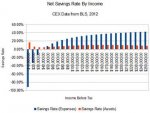That's not actually true. In economics we've found that as income increases the marginal propensity to consume decreases. Or in other words, looking at the broad economy, people tend to consume only so much before they stop spending money. Individuals' income levels far outpace their ability to spend money in today's economies.
Take a look at the below BLS graph which showing savings rates as an example for the USA. These are not "savings" as in savings accounts, or investments, but "savings" as in money that's not immediately spent by the person. (
Income - Consumption = Savings)
Notice in the graph that as income rises, people are less able to keep up their consumption with their income level. On average a person making $250.000 is only able to spend 60% of their income; whereas a person making $100.000 is only able to spend 80% of their income. Which means that the wealthier person
not taxed on 40% of their wealthy, while the relatively poorer person is
not taxed on 20% of their wealth.
Also notice how people making less than $30K / year have a negative savings rate. Those income levels on a whole tend to have higher Consumption > than Incomes, which means that their "left over" money is in the negative. Typically those people are retirees, or those in deep debt or on welfare.
View attachment 67200105
Savings by Income in America: a Calculator - DQYDJ
What that means is if we had only a consumption tax, the wealthiest would end up paying a smaller tax rates than the poorest.


